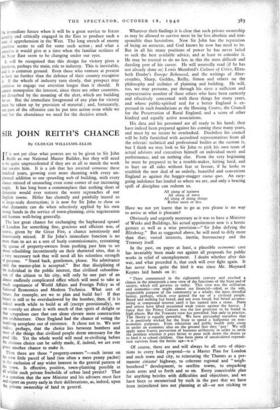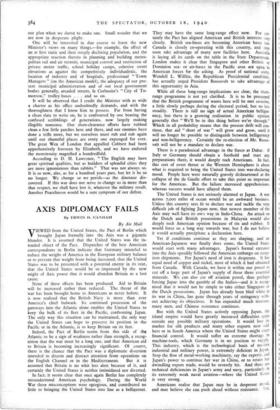SIR JOHN REITH'S CHANCE
By CLOUGH WILLIANIS-ELLIS
IT is not yet clear what powers are to be given to Sir John Reith as our National Master Builder, but they will need to be quite unprecedented if they are at all to match the work that awaits him. It is a job that has awaited someone these hundred years, growing ever more daunting with every un- planned addition to our sprawling web of building, with every chance missed of unsnarling even some corner of our increasing tangle. It has long been a commonplace that nothing short of dynamite would ever remove the worst reproaches of our English towns. Hitler has clumsily and painfully inured us to large-scale destruction; it is now for Sir John to show us what dynamite can do when selectively applied by his own strong hands in the service of town-planning, civic regeneration and human well-being generally.
The last great chance for exchanging the haphazard sprawl of London for something fine, gracious and efficient was, of course, given by the Great Fire, a chance notoriously and disastrously missed. If Sir John's immediate function is no more than to act as a sort of burly commissionaire, restraining the queue of property-owners from pushing past him to set about rebuilding incontinently on their shattered sites, that is a very necessary task that will need all his relentless strength of purpose. " Stand back, gentlemen, please. No admittance until the master-plan is accepted." But that disciplining of the individual in the public interest, that civilised subordina- tion of the citizen to his city, will only be one part of an almost endlessly complicated office which will need to take as much cognisance of World Affairs and Foreign Policy as of National Economics and Modern Technics. What sort of future, for example, are we to plan and build for? If that future is still to be overshadowed by the bomber, then, if it is indeed worth while to build at all (except provisionally), we can scarcely set about it with much of that spirit of delight or that scrupulous care that can alone elevate mere construction Into architecture. Once England had the chance of voting the bombing aeroplane out of existence. It chose not to. We now realise, perhaps, that the choice lies between bombers and most of the things that civilised people deem necessary for the good life. Yet the whole world will need re-civilising before the obvious choice can be safely made, if, indeed, we are ever given another chance to make it.
Then there are those " property-owners "—each intent on his own little parcel of land (too often a mere penny packet) to the exclusion of any wider interest in the general pattern of his town. Is effective, positive, town-planning possible at all whilst such private freeholds of urban land persist? That is a question that the new Minister and his advisers must face and report on pretty early in their deliberations, as, indeed, upon the private ownership of land in general. Whatever their findings it is clear that such private ownership as may be allowed to survive must be far less absolute and irre- sponsible than heretofore. Now Sir John has the reputation of being an autocrat, and God knows he now has need to be. But in all his many positions of power he has never failed to seek the best available advice, and at least to cohsider it. He may be trusted to do no less in this the most difficult and dazzling post of his career. He will assuredly read (if he has not already done so) Lewis Mumford's Culture of Cities, Eliza- beth Denby's Europe Rehoused, and the writings of Aber- crombie, Sharp, Geddes, Reilly, Simon and others on the philosophy and technics of planning and building. He will, too, we may presume, put through his sieve a sufficient and representative number of those others who have been earnestly and effectively concerned with these things for many years, and whose public-spirited zeal for a better England is ex- pressed in such foundations as the Housing Centre, the Council for the Preservation of Rural England, and a score of other kindred and equally active associations.
His data and his personnel are all ready to his hand; they have indeed been prepared against his coming these many years, and must by no means be overlooked. Doubtless his council will be fully furnished with accredited representatives from all the relevant technical and professional bodies as the custom is, but I think we may look to Sir John to pick his own team of actual advisers and executives himself on individual merit and performance, and on nothing else. From the very beginning he must be prepared to be a trouble-maker, hitting hard, and to hurt on all sides without fear or favour, if he looks to establish the new deal of an orderly, beautiful and convenient England as against the hugger-mugger status quo. An easy- going indolence has landed us where we are, and only a bracing spell of discipline can redeem us.
All along of laziness All along of mess All along of doing things Rather more or less.
Have we not yet learnt that to go as you please is no way to arrive at what is pleasant?
Obviously and urgently necessary as it was to have a Minister of Works and Buildings, his actual appointment now is a heroic gesture as well as a wise provision—" Sir John defying the Blitzkrieg." But as suggested above, he will need to defy more than that; vested interests, inertia, bureaucracy and the Treasury itself.
In the past, on paper at least, a plausible economic case has invariably been made out against all proposals for public works in relief of unemployment. I doubt whether after this war, and what preceded it, that cock will ever fight again. It has never been quite the bird it was since Mr. Maynard Keynes laid hands on it:
" There commenced in the eighteenth century and reached a climax in the nineteenth a new view of the functions of the State and of society, which still governs us today. This view was the utilitarian and economic—one might almost say financial—ideal, as the sole, respectable purpose of the community as a whole; the most dreadful heresy, perhaps, which ever gained the ear of a civilised people. Bread and nothing but bread, and not even bread, but bread accumu- lating at compound interest until it has turned into a stone. Poets and artists have lifted occasional weak voices against the heresy. I fancy that the Prince Consort was the last protestor to be found in high places. But the Treasury view has prevailed. Not only in practice. The theory is equally powerful. We have persuaded ourselves that it is positively wicked for the State to spend a halfpenny on non- economic purposes. Even education and public health only creep in under an economic alias on the ground that they ' pay.' We still apply some frantic perversion of business arithmetic in order to settle the problem whether it pays better to pour milk down the drains or to feed it to school children. One form alone of uncalculated expendi- ture survives from the heroic age—n
Of course, there are and will always be all sorts of objec- tions to every bold proposal—to a Master Plan for London and each town and city, to reinstating the Thames as a per- manent citizens' highway, to coherent regional and " neigh- bourhood " development, to satellite towns, to emparking slum areas and so forth and so on. Every conceivable plan for anything bristles with difficulties and objections, and we have been so mesmerised by such in the past that we have been intimidated into not planning at all—or not sticking to our plan when we dared to make one. Small wonder that we are now in desperate plight.
One will be interested in due course to learn the new Minister's views on many things,—for example, the effect of an at first static and then steeply declining population, and the appropriate reaction thereto in planning and building metro- politan rail and air termini, municipal control and restriction of private motor traffic, school holiday camps, cohesive street elevations as against the competitively individualistic, the location of industry and of hospitals, professional " Town Managers " (on the American model), the adequacy of our pre- sent municipal administration and of our local government bodies generally, arcaded streets, le Corbusier's " City of To- morrow," trolley -buses . . . and so on.
It will be observed that I credit the Minister with as wide a charter as his office undoubtedly demands, and with the thoroughness that I know him to possess. Far from having a clean slate to write on, he is confronted by one bearing the confused scribblings of generations, now largely making illegible nonsense. Our slum-clearance efforts have rubbed clean a few little patches here and there, and our enemies have done a trifle more, but we ourselves must rub and rub again until our shameful places are every one expunged for ever. The great Wen of London that appalled Cobbett had been apprehensively foreseen by Elizabeth, and we have endured the monstrosity magnified a hundredfold.
According to D. H. Lawrence, " The English may have great spiritual qualities, but as builders of splendid cities they are more ignominious than rabbits." That was not always so. It is so now, alas, as for a hundred years past, but let it be so no longer. We change or we perish—as the dinosaur dis- covered. If this war does not serve to change us in more than that respect, we shall have lost it, whatever the military result. Another Peacehaven would be a sure symptom of our defeat.































 Previous page
Previous page